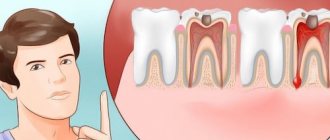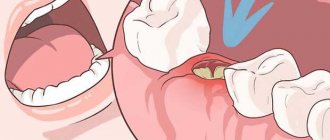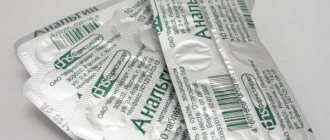Composition of the drug
Tablets called "Ibuprofen" contain the main substance called the same term. Each capsule contains 200 mg of this component. Additional substances in the product include: sucrose, gelatin, potato starch.
Ibuprofen for toothache is allowed to be used in extreme cases, for example, if it is not possible to urgently see a doctor. It is important to follow all dosages and rules of use of the drug specified in the instructions. The tablets are for oral administration only.
After treatment, be sure to contact a dentist, since only he can accurately determine the problem and find an effective way to solve it. When visiting a doctor, the patient must inform them that they have taken the drug so that the dentist can more accurately determine the advanced stage of the disease.
According to patient reviews, the drug helps 20 minutes after oral administration. The pain subsides on average for 6 hours. However, we must remember that each person’s body is individual, so the duration of the therapeutic effect of the drug will differ for each patient.
If no therapeutic effect was noted after taking Ibuprofen, then you should not take the capsules again. In this case, it is better to urgently visit a doctor or call an ambulance.
Will it help?
Of course, before taking painkillers for a toothache, you should assess the degree of pain and think about the potential consequences of taking medications. In fact, according to statistics, very few people think about these aspects as soon as they experience pain in the oral cavity.
The most important fact is that relieving toothache with tablets will only be a temporary solution. This approach will help alleviate the general condition, but only for a certain time.
It should also be noted that tooth pain is often accompanied by concomitant symptoms, which manifest themselves in inflammation of the gums, cheek area, increased body temperature and a feeling of general malaise. Many of the tablets help relieve secondary manifestations, but have no effect on the cause.
This is why in most cases a visit to the dentist will still be required. After all, the painkiller will simply reduce the level of pain, but not for long. Moreover, in many situations the ongoing disease will only gain momentum and the pain will increase. Therefore, there is no point in enduring without visiting a doctor for a long period with persistent toothache.
Action of the medication
Does Ibuprofen help with toothache? The drug can eliminate several unpleasant symptoms that accompany dental problems:
- pain;
- temperature increase;
- swelling and inflammation of the soft tissues of the mouth.
Pain is a signal from the brain that problems are occurring in the body. Discomfort in the oral cavity is a symptom that the tooth is undergoing destruction under the influence of pathogenic flora
If pain is observed constantly, this means that the nerve endings of the tooth or the soft tissue located next to it have been destroyed. Ibuprofen reduces symptoms of discomfort by blocking nerve impulses from the affected area to the brain.
You cannot rely only on the effect of painkillers. The person will not feel discomfort, but the destructive processes in the dental tissues will continue. This condition can lead to more dangerous complications and loss of the unit.
The main advantage of Ibuprofen is that it has a complex effect on the body. That is, a person does not need to take a handful of pills to eliminate fever, relieve swelling of soft tissues and relieve pain. A small amount of medication is enough to cope with the signs of dental diseases. Thanks to this property, the load on internal organs (kidneys, liver, pancreas) is reduced.
Contraindications
General contraindications:
- complete or partial combination of symptoms of the Fernand-Vidal triad (including a history);
- the presence of erosions and ulcers in the digestive canal;
- hemostasis disorders ;
- active gastric/intestinal bleeding ;
- severe liver failure;
- progressive kidney pathologies;
- renal failure in which Clcr does not exceed 30 ml/min;
- conditions after CABG ( coronary artery bypass grafting );
- chronic inflammatory processes in the intestines;
- confirmed hyperkalemia ;
- 3rd trimester of pregnancy;
- hypersensitivity.
In pediatrics, suspension and suppositories are used from 3 months, tablets - from 6 years of age.
Caution should be exercised when prescribing Ibuprofen for:
- liver cirrhosis , which is complicated by portal hypertension ;
- gastritis;
- colitis;
- enteritis;
- history of stomach/duodenal ulcer
- nephrotic syndrome;
- insufficiency of heart, kidney or liver function;
- IHD;
- arterial hypertension;
- cerebrovascular diseases;
- dys- or hyperlipidemia ;
- peripheral arterial diseases;
- the presence of Helicobacter pylori infection ;
- severe somatic pathologies;
- blood diseases of unknown etiology.
The drug is also prescribed with caution to persons suffering from alcoholism , long-term use of NSAIDs, taking oral corticosteroids, SSRIs, antiplatelet agents and anticoagulants, in the first 26-27 weeks of pregnancy, and lactating women.
Children under one year of age should be given the drug only on the recommendation of a pediatrician.
Methods of application
Ibuprofen is used when it is not possible to see a doctor immediately. It is advisable that after taking the drug, the dentist examines the patient a few days later. This will prevent complications. Uncontrolled use of painkillers can lead to serious consequences associated with disruption of the functioning of the digestive system and intoxication of the body.
The dosage of the drug for adults and children over 13 years of age is standard and is 600-800 mg per day or 1 tablet 3-4 times a day. If severe pain bothers you or there is an urgent need to relieve pain, then the dosage is increased to 1200 mg per day (2 capsules three times a day). After achieving the desired effect, the amount of the drug taken is reduced to 600-800 mg.
Children under 13 years of age are given the drug only with the permission of a doctor. Typically, children are also recommended to take 1 capsule 2-3 times a day. It is important that the child’s weight is more than 20 kg, and the interval between doses is at least 5-5.5 hours.
If Ibuprofen therapy is carried out for several days, then the first dose is taken in the morning on an empty stomach. Have breakfast after 15-20 minutes. The tablet should not remain in an empty stomach for a long time, so as not to provoke the development of ulcers or gastritis. For this reason, the drug is taken with plenty of water.
If the drug does not work, you should not take it again. It is also prohibited to take another medication with a similar effect to Ibuprofen. The described actions often cause an overdose. It is even more dangerous to mix painkillers with each other.
Many patients with toothache use Ibuprofen topically. They crush the tablet and place the powder into the carious cavity. In some cases, such methods help, but often the drug leads to even greater destruction of bone tissue and progression of the carious process.
For children
Ibuprofen is not usually prescribed to children for toothache. This is due to a large number of side effects of medications. Children are also more likely to experience intolerance to the propionic acid contained in the product.
Ibuprofen syrup for children
For children, it is preferable to purchase not tablets, but a product in the form of a syrup with a dosage of 100 mg per 5 ml. Thanks to this form of release, it will be easier to calculate the dosage needed by the child based on his age and weight. The syrup has a pleasant sweetish flavor and can be diluted with water, compote and other liquids.
For pregnant
During pregnancy, Ibuprofen is taken with caution, since at this time the load on the urinary system increases. They try to select the dosage in minimal quantities. Pregnant women are allowed to drink no more than 400 mg of Ibuprofen per day. For moderate pain, it is better to give preference to less dangerous painkillers - Papaverine, Nosh-pe. It is advisable that the tablets be consumed after meals to avoid causing heartburn and stomach pain.
Contraindications and side effects
The medicine is taken after studying all contraindications to it. This will make it easier to minimize the risk of side effects, including:
Home remedy for toothache
- bronchospasms and shortness of breath;
- problems from the gastrointestinal tract: nausea, vomiting, diarrhea, pain in the upper abdomen;
- headache;
- deterioration of visual and auditory functions;
- allergic reactions from the skin (rashes on the body) and the respiratory system (swelling of the larynx, attacks of suffocation);
- exacerbation of cystitis and nephritis;
- increased sweating;
- internal bleeding (usually observed with long-term use of the drug).
If you notice any of the above symptoms, you should immediately stop taking Ibuprofen and consult your doctor.
You should refrain from using the product if you have one of the following pathologies:
- gastrointestinal disorders;
- inflammatory bowel diseases;
- problems with blood clotting.
Ibuprofen is prohibited for children under 6 years of age; pregnant women; persons with individual intolerance to acetylsalicylic acid; patients who have recently undergone surgery.
Ibuprofen therapy should be used with caution during breastfeeding, since the active component passes into breast milk in small quantities. However, in practice, doctors have identified negative reactions for the child when a nursing mother takes an anesthetic. Elderly people and people suffering from diabetes need to take the medicine carefully.
Indications for use
Ibuprofen - what is it?
Ibuprofen is a non-narcotic analgesic that belongs to the NSAID group. Has pronounced anti-inflammatory activity.
These properties allow the drug to be used for heat and pain (mild and moderate intensity), polymyalgia rheumatica , and inflammatory and degenerative diseases of the musculoskeletal system.
Ibuprofen is included in the WHO list of essential medicines.
What is Ibuprofen tablets for?
Tablets are prescribed for:
- inflammatory diseases of the spine and joints ( ankylosing spondylitis , gouty and rheumatoid arthritis , osteoarthritis , etc.);
- moderate pain of various etiologies (the medicine helps with pain during menstruation, toothache, headache, migraine attack , myalgia , neuralgia , post-traumatic and postoperative pain, etc.);
- fever due to infectious or colds.
It should be remembered that tablets (like other dosage forms) are intended for symptomatic therapy, reducing pain intensity and relieving inflammation; the medicine has no effect on the progression of pathology.
Indications for use of gel and ointment
Gel and ointment with ibuprofen are effective for inflammatory and degenerative diseases of the musculoskeletal system:
- psoriatic , gouty and rheumatoid arthritis ;
- humeroscapular periarthritis;
- osteoarthritis;
- radicular syndrome in osteochondrosis ;
- ankylosing spondylitis;
- bursitis;
- sciatica;
- lumbago;
- radiculitis;
- myalgia;
- tendovaginitis;
- tendonitis;
- worsened gout;
- injuries in which the integrity of soft tissues is not compromised (rupture/sprain of ligaments, dislocation, bruise, post-traumatic swelling, etc.).
Indications for use of suppositories and syrup
Ibuprofen syrup and suppositories are dosage forms that were developed specifically for use in pediatric practice. They are prescribed to children for:
- reducing temperature during acute respiratory viral infections , childhood infections, influenza and other infectious and inflammatory diseases ;
- decrease in temperature during post-vaccination reactions;
- reducing the intensity of mild/moderate pain (the product can be used for toothache and headache, ear or throat pain, ligament damage, neuralgia, etc.).
Suppositories are intended for children 3-24 months, Ibuprofen syrup is used to treat children from 3 months to 12 years.
What is Ibuprofen used for injection?
Injections are used to treat congenital heart disease in premature newborns.
Reviews about the treatment
Irina, 25 years old. My mother used ibuprofen to eliminate the symptoms of a cold, but I did not imagine that the medication would also be suitable for suppressing toothaches. Once, after dental treatment, my gums hurt badly, the only medication I took was Ibuprofen. I thought that if it effectively eliminates the signs of inflammation during a cold, then it could also help with toothache. The discomfort passed very quickly - within 10 minutes. Now I always carry the product with me in my purse because it is inexpensive and saves me from many types of problems. Among the disadvantages of Ibuprofen, only its chemical composition can be noted.
Larisa 38, years old. I have always appreciated Ibuprofen as a powerful pain reliever. I decided to give it to my 12-year-old son after he had a toothache and a fever. The remedy did not help us, the temperature subsided quite a bit, and the intensity of the pain did not change. For this reason, I advise you to resort to more modern and effective drugs for the problem, for example, Naizu or Ketanov. Among the disadvantages of the tablets, I can note numerous contraindications. Before taking Ibuprofen, you should carefully read all the contraindications and possible side effects.
Alla, 41. A few months ago my enamel sensitivity worsened. My teeth hurt and ached a lot, especially when eating hot and cold food. At some point the pain became so intense that it was difficult for me to fall asleep. Ibuprofen tablets helped cope with unpleasant symptoms. I take painkillers about once a month (for exacerbation of enamel sensitivity, headaches) and do not notice any side effects.











